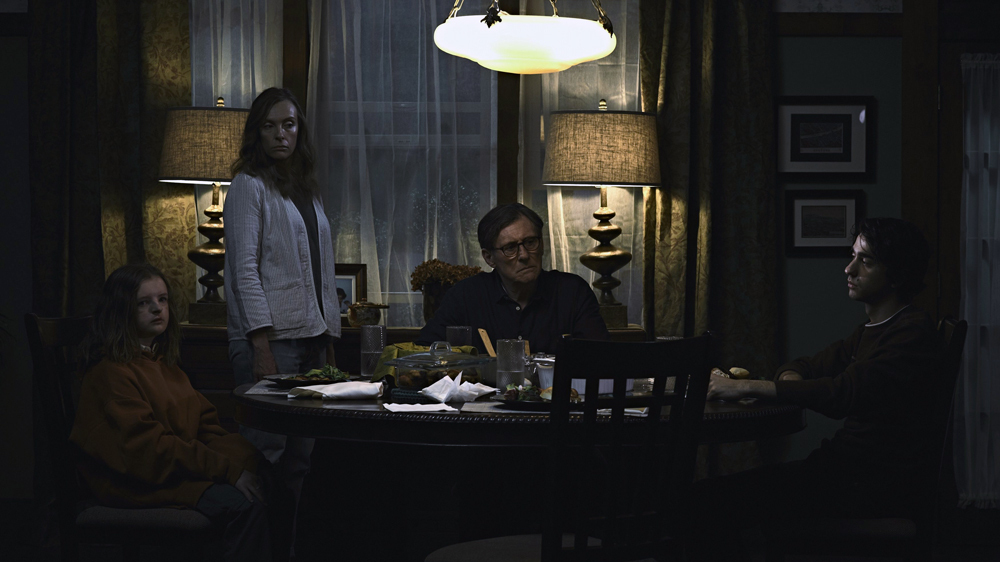
Hereditary follows the Graham family, father Steve (Gabriel Byrne), mother Annie (Toni Collette), son Peter (Alex Wolff), and daughter Charlie (Milly Shapiro) in the wake of the death of the family’s matriarch, their grandmother Ellen. As the family copes with its loss, mystery about their secretive grandmother’s life begins to unravel as the world around them begins to crumble and tragedy continues to strike. It is left up to Annie to save her family before it’s too late.
Hereditary is a film that skillfully employs storytelling, both visually and through its writing. This is established from the very beginning of the film, through its opening long shot of Steve and Peter in Peter’s room that is so zoomed out, it makes the room and its inhabitants appear as if they’re dolls inside of a dollhouse. This visual choice turns out to be a deliberate one as it is later revealed that Annie is a dollhouse maker. The constant display of dollhouses and figurines representing the various characters within the film also serves as a metaphor for the film’s story and the manipulation of each individual and their lives within a larger plan, as if they were dolls. Hereditary overflows with nuggets of foreshadowing placed throughout the film that reward attentive viewers. The most common visual cue is the three pronged symbol that appears on necklaces, walls, and various other random household items that eventually connect to the Satanic cult at the center of all of the mysterious happenings that occur. Additional hints are scattered throughout the dialogue, such as two conversations that Annie has; one at a grief support group regarding the death of her brother and his insistence that their mother was “trying to put people into his head” and the other with Charlie where Annie recalls how the child has never really ever cried, or Charlie’s offhand comment about her Grandmother wishing she were born a boy.
All of these small hints embedded within the dialogue serve as sorts of puzzle pieces that slowly connect together as the film goes on, culminating in the explosive third act where everything comes full circle. Hereditary commands our attention not just through tension and plot, but because it is the type of film that rewards the astute viewer that pays attention to the small details. This detailed storytelling helps to fully engross the audience and keep them engaged through the two-hour run time as they work in tandem with Annie to unravel just what is happening and how everything fits together. There is no wasted imagery or dialogue as we come to find out in the end where all of the pieces fit to create a clear picture of what exactly has happened to this family and who was pulling the strings for the entirety of their lives.
In addition to its well executed storytelling, Hereditary offers a thematic depth that allows it to stand out as more than just a standard horror film. The fear and scares present are more than just about witches and spirits, but in how generational pain and how families deal with tragedy. As the history of Graham family comes into focus, so too do their generational issues with communication and the resulting dysfunction it has sparked. It creates a sort of double meaning for the film’s title; the spiritual abilities are inherited, as are their problems with honesty. Annie and Peter have a strained relationship devoid of trust and an ability to communicate with each other, mirroring the relationship that Annie and her brother had with Ellen. Annie’s inability to speak up in the face of her mother’s treatment of her transferred itself to how she interacted with her own son, resulting in the same lack of love and openness. This dynamic is a common one in families, where issues and strains become a way of life and habit passed on down the genetic line. The inability to talk through feelings, even in the wake of the tragedies the families suffer, is something that plagues many families and western society in general, making Hereditary topical in addition to scary.
Toni Collette shines as the main protagonist, masterfully portraying all of the emotions experienced as a grieving daughter and mother, traumatized by both her present pain and the pain of a tough childhood. Two scene performances that could surely be shown on her Oscar nomination reel are the pure anguish she experiences when she suffers from a parent’s worst nightmare, and her display of the pent-up frustration she has accumulated over the years from her strained relationship with Peter. Both feel like very real displays of the dysfunction from a family that has been in turmoil for years, hidden just under the surface of a veneer of normalcy and harmony. As the Academy seems to slowly be embracing recognition of genre fare with last year’s wins for Get Out and The Shape of Water, Collette’s performance could find itself on the short list of potential Oscar nominees if Hereditary’s June release isn’t an obstacle.
Hereditary is a horror film that shuns jump scares and overtly terrifying imagery in exchange for tension that is built through the use of music, light, and shadow, creating a sense of dread even when ultimately, nothing comes from it. The story in the film is well crafted and develops in a multitude of ways both through its clever visuals and detailed writing that slowly unravels the mystery at the center of the plot. The rewarding way that the hints all come together to paint a detailed picture in the film’s explosive ending makes the slow burn leading up to it feel worth it in the end. Hereditary further cements the horror genre’s quiet run of excellence during this era of film.
Image: A24

